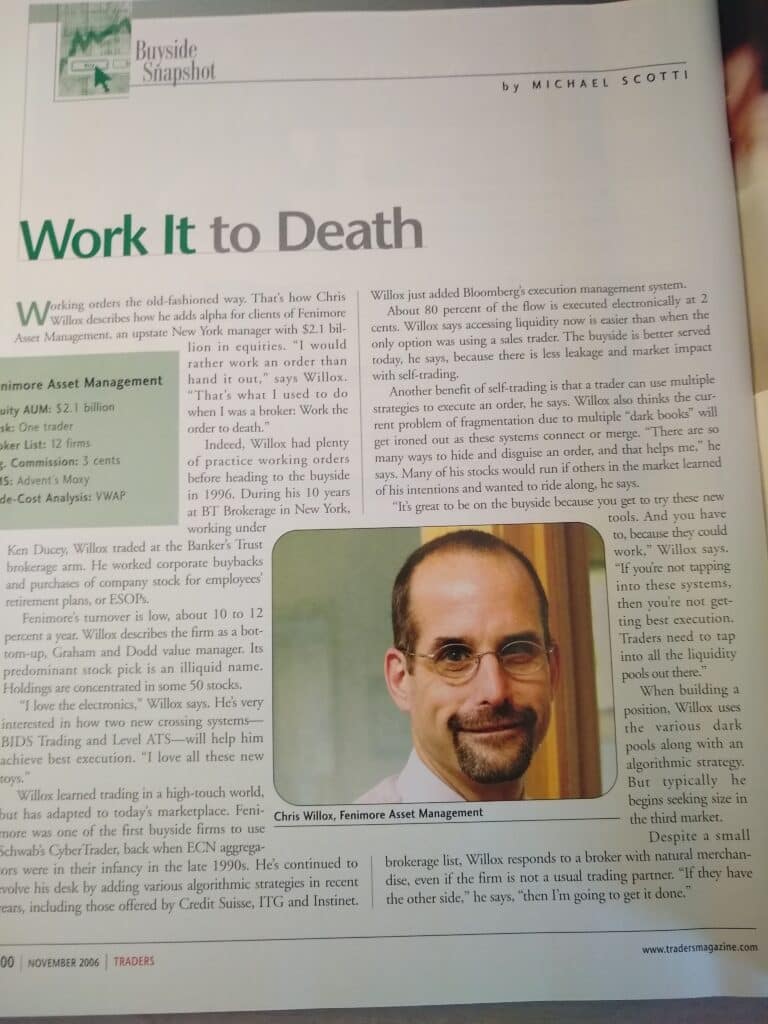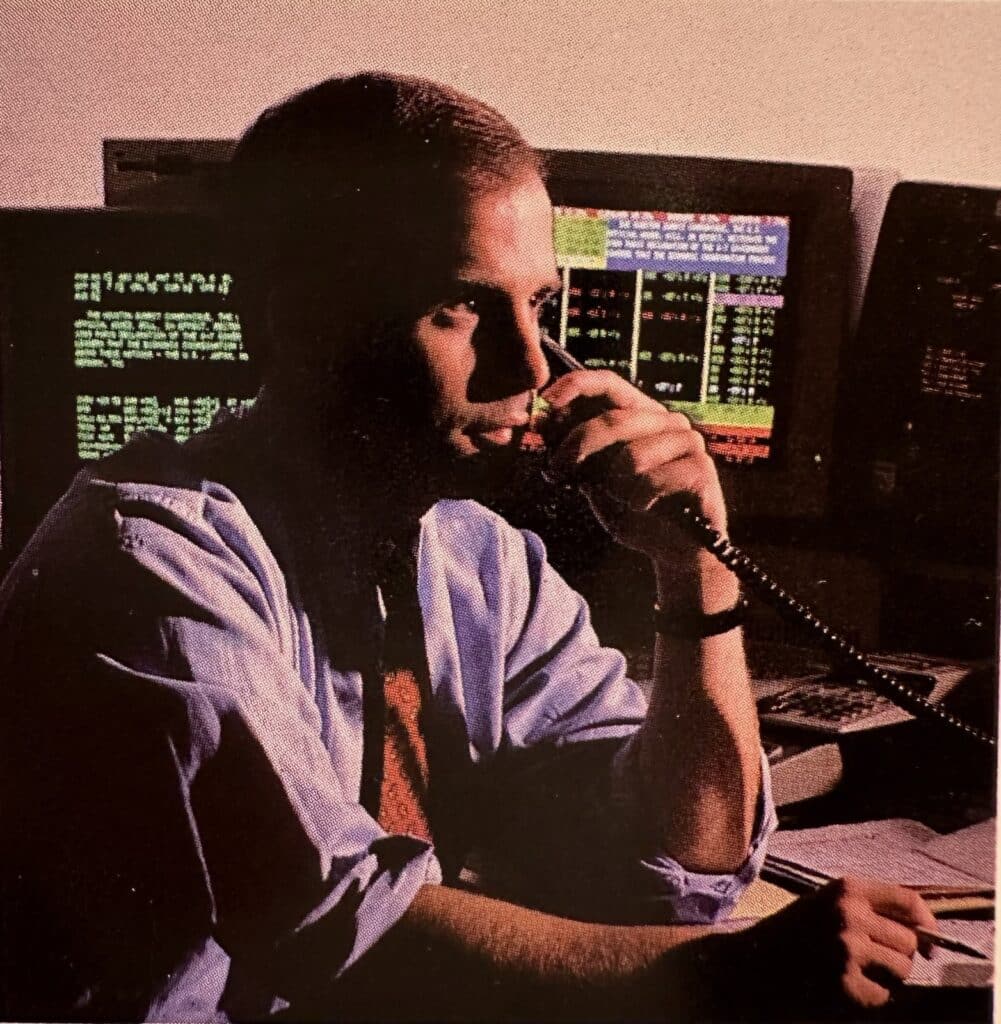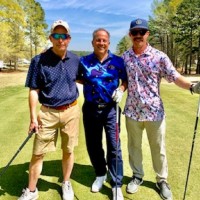FLASH FRIDAY is a weekly content series looking at the past, present and future of capital markets trading and technology. FLASH FRIDAY is sponsored by Instinet, a Nomura company.
When last sighted in the pages of Traders Magazine, buy-side trader Chris Willox talked about how he likes to work trades the old-fashioned way, but he had adapted to an evolving marketplace featuring newer electronic trading venues.
“If you’re not tapping into these systems, then you’re not getting best execution,” Willox said in a November 2006 article. “Traders need to tap into all the liquidity pools out there.”

Then the Director of Trading for Fenimore Asset Management, a $2.1 billion asset manager in upstate New York, Willox discussed the latest electronic trading tools, which at the time included crossing systems BIDS Trading and LeveL ATS.
Almost 18 years later, Willox is living his best life in Georgia, where his semi-retirement includes a part-time gig as information technology program mentor for Western Governors University.
Traders Magazine caught up with Willox to learn more.
We tracked you down after all these years!
Where’d you find me, at my school email?
Yeah. You don’t have the most common surname, so search kicked me to a lot of Wilcoxes. But we made sure to spell it right and we found you. Thanks for responding.
Sure. It’s good to hear from you. I’m retired and I’m old and stuff, and I miss the days of going to conferences and speaking at conferences. I miss the action.
You were a trader from the late ’80s until 2015?
Yep, that’s the whole career, right there.

All right, if you can walk me through a little of the sequence and highlights. You don’t need to go into too much detail. But hit me with what you think are the most important takeaways.
I started in the back office at Salomon Brothers during the Liar’s Poker days, which was a lot of fun. I was a clerk on the trading desk, and as I was watching all the stuff around me I knew I needed to get out of operations and into trading.
But unfortunately for me, they were just bringing in newly minted Ivy League MBAs for all the good sales and trading spots, so I moved over to Brown Brothers Harriman. I was there for a couple years, and then Bankers Trust hired me to start their brokerage subsidiary up when Glass-Steagall fell. I was there for 10 years.
So my career in New York City was about 14 years. It was fun – too much fun sometimes! At some point I knew I had to get out of there and move south.
I checked out a couple of spots down south but nothing really fit. And then my compass didn’t work well, so somehow I moved to upstate New York, moving from the sell side to the buy side. I traded for Fenimore Asset Management, a small mutual fund company, for almost 20 years.
Then I finally figured it out. I was an adjunct professor at the state university right down the road, and I loved it. I said, “You know, I’m kind of done with trading and especially the New York weather. But I can’t retire because I’d go crazy. I think I want to teach.” You know, maybe full-time so I stay out of trouble. I was looking around, and I thought the world would beat a path to my door given all my experience, including over six years as an adjunct professor.
Well, that didn’t happen – nobody wants to hire you when you’re old! I was kind of taken aback by that. I had a couple ideas on where to move, of which Georgia was not one, but I expanded the search, and a community college down here took a chance on me. I taught there for six and a half years, tried my hand as a financial advisor and then Western Governors University saw my experience and now I’m a part-time program mentor for them. It’s fun, I get to help students and still get to play golf and do other fun things that an old guy should do.
How did trading evolve during your time in the business?
It became all screen-based trading. You still called people and you still had relationships, but it just became a big video game after a while, where we’re in dark pools and buying small-cap names and trying not to leave a footprint because everybody’s out to get you and figure out what you’re doing.
So it just became this technology job where you had to figure out how to get stuff done without anybody knowing what you were doing. And that didn’t always work out. In the old days on the buy side, my boss was able to visit and do research on a company and then say, “Chris, I think we want to start buying shares,” before anybody else did. Those days are gone. It’s so efficient now – everything’s crunched in milliseconds, and value investing doesn’t work the way it used to.
Do you still follow the industry? Keep in touch with folks?
I occasionally talk to friends from The Street, but I don’t keep a close eye on the markets. I’m mostly in ETFs and funds – I have a couple stock holdings, but nothing substantial. I still read the Wall Street Journal. I love stories about the crooks, like on American Greed on CNBC and, of course, the Madoff saga. Because like many firms, we dealt with Madoff Securities, which was a legit firm. Never in a million years would I have thought Bernie was running a scam behind the scenes.
But, money makes people crazy. It seems like there’s a new crook every other week.
Would you recommend a career in trading and markets to young people?
Oh, undoubtedly. I think it’s still great. You just have to find your niche, whether it’s analytical or in trading. There are still sales traders out there, but that’s a tough business. Managing money is still a great business. Money makes the world go around.

What’s your life like these days?
I never thought I’d end up in Georgia, but I’m here and it’s great. People from New York go to two states mostly – they go to Florida, where I wasn’t going, and they go to North Carolina because it has seasons. Maybe Myrtle Beach (SC). Nobody goes to Georgia.
I originally moved to Augusta, the home of the Masters. I worked there as a security guard where I had the best seat in the house on the 13th tee. It’s sunny every day, so we stayed and recently moved to Madison, which is between Augusta and Atlanta. We took a flyer on it and got lucky.
I’m 66 now. I’m here with my wife, and I have a son in Athens, which is a half hour away, where the university is. They kind of like football here — in fact, it’s a religion. You don’t even have to go to the school to have Georgia Bulldog stickers and tattoos. We’re in SEC country, and I’m okay with that.







